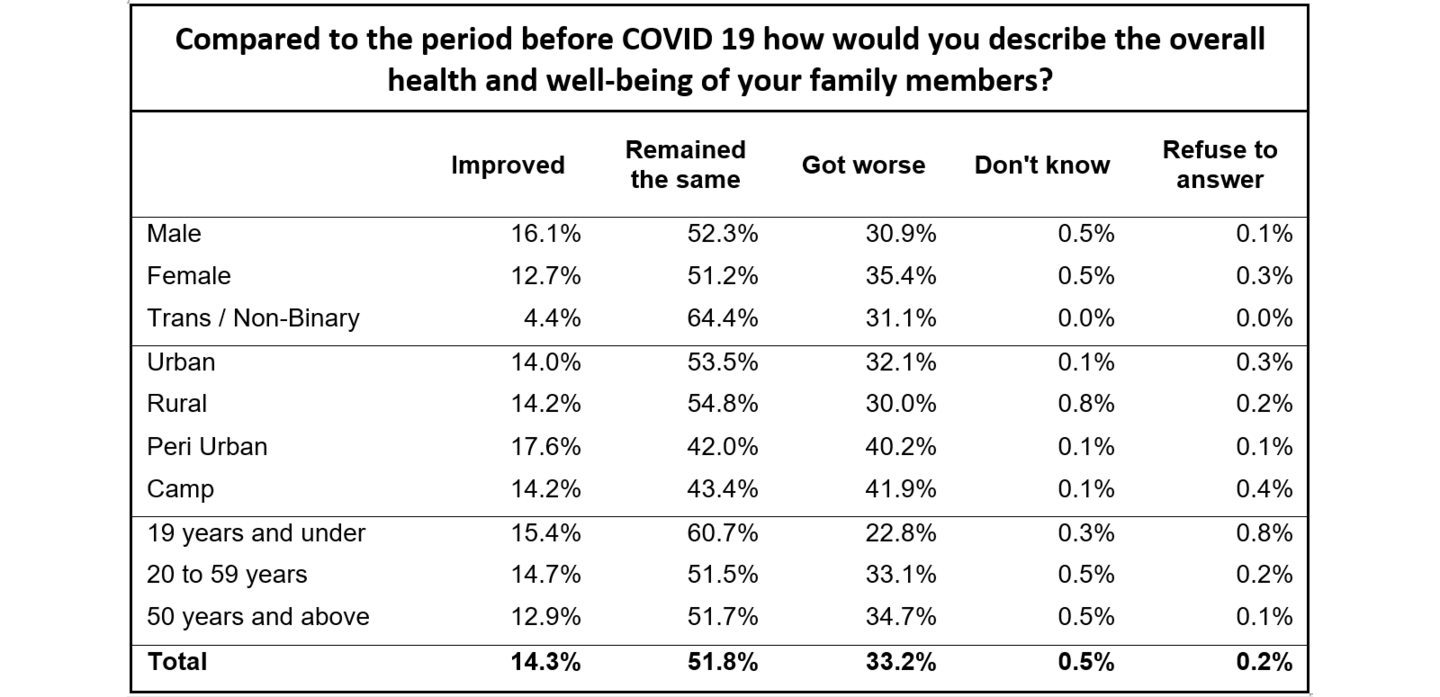The COVID-19 pandemic is testing the resilience of communities globally, exacerbating existing inequities and creating new ones. To ensure that our response to COVID-19 is shaped by evidence, Helvetas together with other Alliance2015 members conducted a survey of over 16,000 women and men in 25 countries. The survey provides shocking information on the impacts of COVID-19 on food security, WASH (water, sanitation, hygiene), health, education, income, indebtedness and psychosocial conditions of households.
1 - Communities are aware of anti-COVID measures but find it difficult to comply with them
Most respondents are aware of the measures to reduce the transmission of COVID-19 such as frequent hand washing (87%) and wearing of masks (81%) but practicing them poses several challenges. The information campaigns have been effective and have reached most of the respondents across all 25 sample countries.
However, the ability to practices some of the recommended measures is highly curtailed due to lack of access to basic hygiene services and products (water, soap, disinfectant, masks). About 1 in every 4 respondents said that they either can’t afford or can’t access basic protection products. Crowded working and living conditions also prevent the poor from adhering to the physical distancing norms.
As the prospect of vaccination reaching people in developing countries in the next months is quite bleak, information and communication efforts and gaps in access to WASH services need continued focus and financing.

2 - Members of poor communities are eating less
Eight months into the pandemic a shocking 40% of respondents say that they and their families are consuming less food and 42% report eating food of worse quality.
Six of the 9 countries with the largest number of respondents reporting this decline are in Sub-Saharan Africa where the extent of hunger, and hunger-induced human development deficits are already among the highest in the world. Afghanistan, Ecuador and Haiti are the other three countries where the largest number of respondents said that they are eating less and lower-quality food. Most of these are food importing countries.
Reduction in food consumption is caused by the combined impact of the loss of incomes, including remittances, increase in local food prices and lack of access to credit.

3 - A vast majority report a decrease in income
Over two-thirds (72%) of farmers report a reduction in income. Half of them say this is on account of disruption of markets and their inability to sell produce. A third report delayed planting and 24% say that they could only cultivate a smaller area of land.
The lockdowns and curfews imposed by governments to control the spread of COVID-19 severely impacted casual workers. Over 91% of them say that their ability to earn an income is adversely affected. Two-thirds (76%) report fewer work opportunities while 48% note lower wage rates. Even among workers with a formal work contract, 63% mention a reduction in income: 35% say this was due to the lockdowns, 27% say their work time was reduced while 26% report their employer had to lay off people.

4 - Families of migrant workers report a decline in remittances
Almost 14% of all respondents say that they receive remittances from family members elsewhere. Over three quarters (81%) of them say either remittances have stopped completely or have reduced. When explaining why it happened, 55% mention income loss of the relative who was sending the money, a significant 38% say that the relative sending money has lost her/his job while 32% attribute it to higher costs of living.

5 - Most borrow money to survive
Almost half of all respondents (47%) said they had to borrow money to cope with the impacts of COVID. There is a very high reliance on informal sources: 61% borrowed from friends and neighbors, 34% from extended family and 11% from loan sharks. Only 6% of respondents report accessing credit from banks and 13% from microfinance institutions (MFI). Community groups, once an important source of consumption loans, especially for women, have been accessed by only 10% of respondents.

6 - A third of the respondents say that their health has declined
A significant 42% of respondents living in camps report a deterioration in their health and well-being now. If we look at women living in camps the number goes up to 48%. At least a third of respondents say they have delayed or skipped visits to health centers or have not attended planned appointments. The main reasons for this are fear of contracting COVID-19, the high cost and the waiting time.

7 - Children’s access to education has worsened
Among respondents with children in their households, almost two-thirds report their children’s access to education has worsened post COVID-19.
Among families with children in the age group of 4 to 16, over 90% report that schools in their locality were closed at some stage as part of the measures to control the spread of the virus. Bolivia, Guatemala and Nepal have the most stringent policies towards school opening with all respondents reporting that the schools were still closed at the time of the survey. In Bangladesh, most of the respondents were from the refugee camps, where the disruption of education was reported to be nearly universal. While Burundi kept the schools open throughout the period, countries like Malawi, Pakistan, Afghanistan and Madagascar have re-opened their schools.

8 - Over 80% are fearful about the future
Over 80% of respondents say they are constantly worried about their current situation and deeply concerned about the future. . Price increases worry most of the respondents (61%). Close to 43% worry about not having a job while 34% are concerned about reductions in their income. High transport costs, which differentially impact the poor who need to go to their workplaces or to markets, are a concern for 34% of the respondents. Inability to pay the next rent, with the looming risk of evictions, is worrying 17% of the respondents, the majority of them in urban areas.

9 - The elderly are the most vulnerable; women suffer more than men
Most respondents (62%) say the elderly are suffering the most due to the pandemic, followed by people with disabilities (52%) and children (48%).
Women-headed households are more impacted according to 50% of the respondents while 46% report differential negative impacts of the pandemic on women in general. Women carry the burden of additional work, childcare, the challenge and stress of having to manage the household with less money; less food, water and space in their homes. Women respondents also talk about a higher reliance on remittances, external support, petty trade and casual labor than men – these sectors have been more adversely impacted by policies to control the spread of COVID-19 than others. While both men and women report their psychological well-being is worse today than before, more women than men report being in a constant state of worry (53%), feeling sad (55%), experiencing mood swings (57%) and finding it difficult to sleep (57%).

About the survey
The survey was carried out by Alliance2015, a strategic network of eight European non-government organizations engaged in humanitarian and development action. Community Resilience is our shared vision and we join forces to achieve a greater impact on poverty reduction; disaster preparedness and response in the framework of the Sustainable Development Goals. The survey was conducted in a 3-week period during October – November 2020.
Download the full report
What’s next?
To respond to the pandemic and continually address the emerging needs of the communities we serve, Helvetas is implementing 130 new or adapted on-going initiatives. We are using these results to adapt our programs, initiate new activities and advocate for better use of the COVID-19 recovery packages. We invite you to join us and support our work, to use our data and analysis for your own program development, communication and advocacy.



